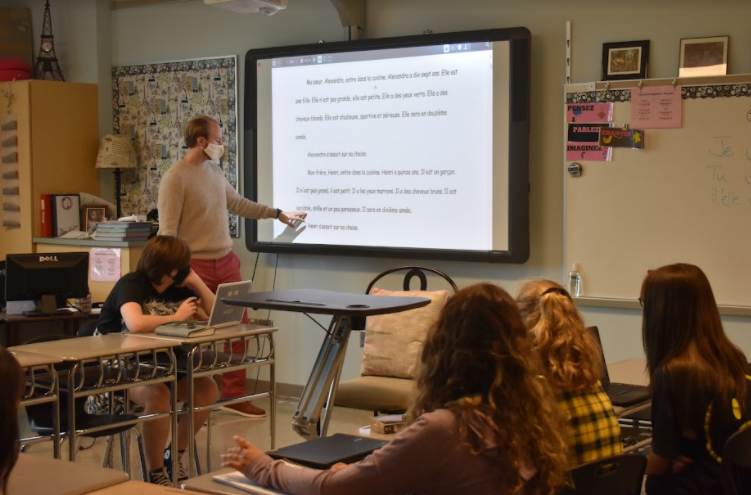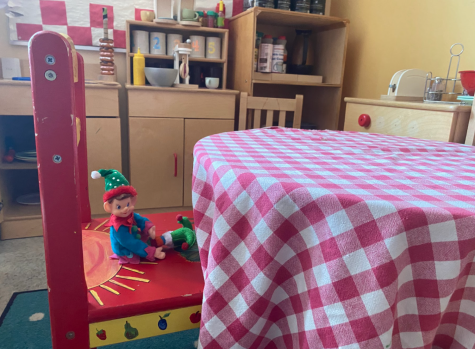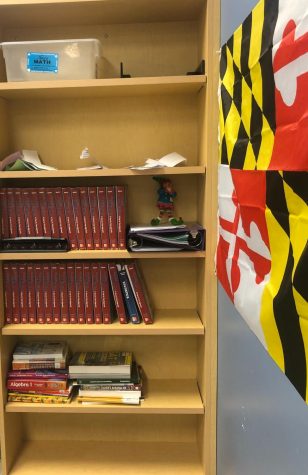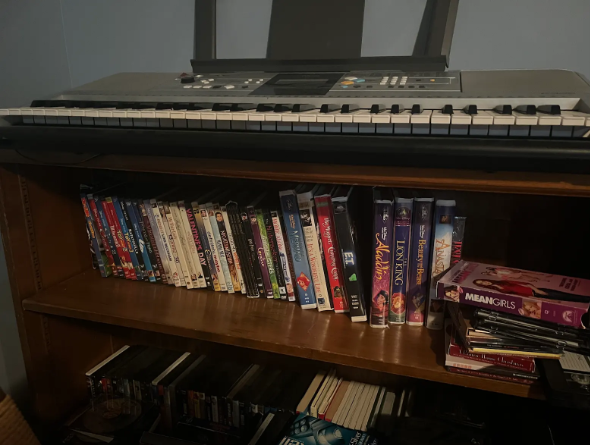Long-term substitutes: the academic heroes of Covid-19
Long-term substitute Jacob McCrary reads a story to his French 1 students to help with reading comprehension.
In elementary school, we all celebrated every time we saw a substitute at the front of the classroom, anticipating a day with far less work and much more fun.
Sophomore Lily Benco remembers one of her third grade substitute teachers. “She let us watch music videos at the end of class and let us talk all day. It gave us someone new to talk to instead of our teacher, and she gave us M&M’s!”
Fun for kids–not so fun for the substitute.
While substitutes created this shared positive experience of childhood, they play a more critical role in high school. Regardless of grade level, substitutes are essential. They pick up jobs at any moment and adapt quickly to their altered environments. Their job is to support learning and make instant connections with students they do not know, all while being paid far less than their full-time colleagues.
Throughout the pandemic, there has been a shortage of substitute teachers. Naturally, no one wants to work in an environment where they are at high risk for getting Covid–or being sassed by a student.
Robert Wedge, the Senior Manager of Frontline Absence Management at FCPS said, “Substitute teacher staffing has always been challenging, but the pandemic has really increased this challenge.”
Being around students with the potential to spread the virus is not the ideal work environment. More specifically, there has been a shortage of long-term substitute teachers. Being a teacher is already high on my list of unwanted jobs–right next to flight attendant and telemarketer.
But being a long-term substitute is one of the lowest on any list of occupations.
In high schools, students scrutinize teachers, whether they are substitutes or not. Substitute teachers are often more harshly judged than regular faculty. Trickster-students find it easier to harshly judge a stranger and not face any consequences. Similar to what we all experienced in elementary school, these kids take advantage of the situation to goof off.
Mrs. Pat Carson, a regular substitute teacher and retired FCPS employee, said, “There are good days and ‘not so good days’ in any classroom. Most students are usually pretty good–especially when they know the substitute. Some, however, are very difficult and they can make a period tough for the substitute and the other students.”
Sophomore Annabel Geisler agrees, “I have noticed some students act differently, such as talking more or not focusing as much.”
A bigger problem is students are faced with falling behind because they do not have a schedule and teacher to support them. A long term substitute may not have the same knowledge as a regular teacher might, the same lesson plans, or the same compassion to teach.
This quick adjustment to a new environment means that substitute teachers may have to present material on which they are not experts. Additionally, they may lack the skills and confidence required to teach, which is obvious to students that they are nervous or unprepared. This makes the substitutes more vulnerable to criticism and their already thankless task even more challenging.
In Frederick County, substitutes earn $100 a day (approx. $14.00 an hour), with a bonus for Mondays and Fridays. This compensation is a fraction of what regular faculty make and less than what many entry-level workers make–including teens.
Personally, the low pay, high pressure, and long hours of being a regular teacher would be a deal breaker for me. Who would want to cater to temperamental teenagers with hardly any recognition or reward? It is no wonder that no one wants to take up the job of being a long-term substitute teacher, especially with the added risk of contracting Covid.
Over this nearly two year long pandemic, regular teachers and their family members have endured heightened risk of getting Covid. The lack of ventilation in schools, mobs of students in every classroom, the difficulty in fully complying with mask mandates, and our initial lack of understanding of how Covid spreads created a high-risk work environment.
These problems mean that teachers all across the country may have stepped away from the classroom, leaving vacancies for longer periods of time. In invisible capes and with superpowers of patience and adaptability, our long-term substitute teachers carry the torch of learning and continue educational priorities during regular teachers’ absences.
It takes courage to step up to the job, taking on all of the responsibilities of being a teacher for extended periods with varying subjects, locations, and grade levels. Long-term substitutes are suddenly responsible for grading, delivering, making lessons, and providing a safe environment for their students.
My French class has had different substitutes. World languages are particularly difficult to staff. Luckily, within a few weeks of one teacher’s absence, Jacob McCrary, our new long-term substitute, had already been hired and has acclimated to the classroom.
With the shortage of substitute teachers combined with the lack of French-speaking teachers, I can imagine that the administration struggled to find possible alternatives. I was lucky enough to end up with a long-term substitute who has a background in French language and culture.
Despite Mr. McCary being fluent in French, he is not familiar with the curriculum or where my teacher had left off. He comes to Linganore from work in the private sector of insurance property management–but he does have a degree in French! That’s a bonus most long-term substitutes may not have.
McCrary said, “For a long-term sub position it has been challenging. Creating a new lesson plan or attempting to build upon the one that was in place while also trying to get to know the students can be a large obstacle. On top of that you are having to learn the grading system and how the school operates at the same time.” We all have trouble with Schoology, imagine a substitute teacher having to learn it by starting from scratch!
Jake Snow, World Languages Department Chair created lesson plans for my class. Snow is already busy with his other classes: teaching, creating lesson plans, tutoring students, grading, etc. The extra work Snow faces is not easy, especially given the circumstances brought on by Covid.
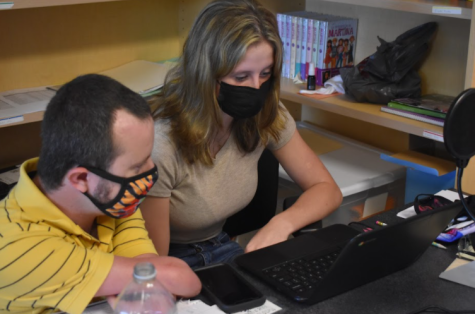
Snow said, “Adjusting to the addition of the French classes has been probably the second greatest challenge in my career.”
French student Noel MacFarlane said, “I find it a little bit more difficult just because the teaching style of the substitute is very different.”
In agreement with MacFarlane, Geisler said, “Adjusting to having a different teacher and the style they teach has been hard especially when taking a language because you get used to learning a certain way. The structure and set up of different teachers varies making it difficult to really learn a second language.”
Being a foreign language teacher is unique in that it requires immense effort, patience, and expertise in the language.
Snow said, “There are definitely a number of challenges to being a teacher of a foreign language. I’d have to say that the first challenge is to really know the science of language acquisition. Knowing how humans acquire language is very different from how we tend to think about language instruction.”
I see it in my learning of French: conjugating verbs is very different from trying to speak or read.
Since students already know how to speak one language, starting from scratch to acquire a new language necessitates a teacher with unflagging enthusiasm for the language and their students’ progress. I cannot imagine how brave a long-term substitute must be to teach students how to speak an entirely different language while simultaneously conducting all the normal responsibilities of being a teacher with the same amount of passion.
Hopefully this pandemic is a once in a lifetime event in our generation’s educational experience, but we aren’t out of the woods yet. While we are still trudging through the mess Covid has left behind, one thing is clear; education during this time has been excruciatingly grueling.
The happiness we have all felt as elementary school children when a new face was in charge for the day matches the gratitude we now feel for long-term substitute teachers. They have saved our classrooms during Covid by rising to the challenge and showing extreme resolve doing a dreaded yet vital job.
So, if you are reading this, thank a substitute teacher.
Your donation will support the student journalists of Linganore High School. Your contribution will allow us to purchase camera/recording equipment and software. We hope to raise enough money to re-start a monthly printed issue of our paper.


